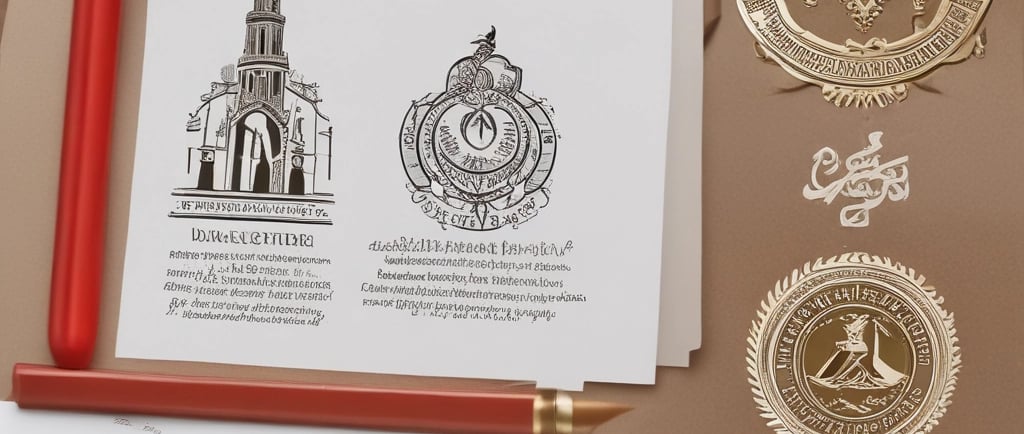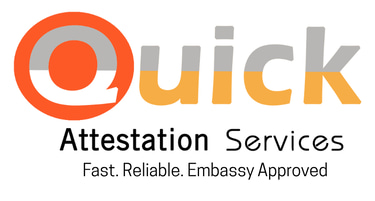The Growing Importance of Certificate Attestation in the UAE
7/7/20254 min read


Understanding Certificate Attestation
Certificate attestation refers to the process of verifying the authenticity of various documents that have been issued in foreign countries, ensuring they hold legal validity in the United Arab Emirates (UAE). This procedure is increasingly important for individuals seeking employment, education, or legal recognition of their credentials within the UAE's jurisdiction. The attestation process confirms that a document is genuine and has not been forged, which is crucial for maintaining the integrity of the educational and professional systems in the UAE.
The types of documents that typically require attestation include educational certificates, marriage certificates, birth certificates, and corporate documents, among others. Educational credentials such as degrees, diplomas, and transcripts undergo rigorous checks to ensure that they meet the UAE's educational standards. Professional documents, including employment letters and licenses, are also subject to attestation to confirm their legitimacy before they can be accepted by UAE authorities.
The process of certificate attestation involves multiple steps, beginning from the origin country of the document. Initially, the document must be verified by the relevant authority in that country, which often includes the Ministry of Education or other regulatory bodies. Following this, the document is submitted to the UAE Embassy or Consulate in that country for further verification. Finally, upon arriving in the UAE, the document may require validation from the Ministry of Foreign Affairs and International Cooperation (MOFAIC) to ensure it is recognized for use within the UAE.
Various institutions play crucial roles in facilitating the attestation process. These include educational institutions, government bodies, and the embassies of the respective countries, all of which work together to maintain the standards required for certificate recognition in the UAE. This collaborative effort underscores the significance of certificate attestation as a means to uphold the authenticity and reliability of documents used in a rapidly globalizing society.
The Legal Necessity of Attestation in the UAE
In the United Arab Emirates (UAE), certificate attestation serves a vital role in validating the authenticity of documents used by expatriates and residents. This legal requirement is mandatory for various purposes, including educational and employment pursuits, as well as facilitating governmental procedures. The attestation process ensures that the documents presented to employers, educational institutions, and government authorities are credible and recognized. Without this verification, individuals may face significant obstacles in their professional and personal endeavors.
Expatriates and residents often require attested documents such as degrees, marriage certificates, and birth certificates for employment applications, visa processing, and enrolling in educational institutions. Many employers and academic institutions in the UAE stipulate that applicants submit only attested documents, recognizing that these are crucial for upholding standards of qualification and identity verification. Failing to provide attested certifications may lead to the rejection of job applications or admission requests, jeopardizing an individual's career trajectory or educational aspirations.
The implications of unverified documentation can be severe, leading to delayed immigration processes, legal complications, or even penalties for using fraudulent or non-verified certificates. Such risks highlight the importance of adhering to legal frameworks governing document verification in the UAE. The governmental authorities take a strict stand against documents that lack proper attestation, as they aim to maintain the integrity of legal and professional channels within the country. Consequently, navigating the bureaucratic landscape of the UAE necessitates a thorough understanding of the certificate attestation requirements in order to avoid adverse legal repercussions.
The Impact of Certificate Attestation on Opportunities in the UAE
In the United Arab Emirates (UAE), certificate attestation has emerged as a critical component for individuals seeking to maximize professional and educational opportunities. As the nation continues to attract a diverse workforce and a multitude of international students, the importance of having documents like degrees, diplomas, and professional certifications attested is paramount. This process validates the authenticity of documents, enabling smoother navigation through various institutional requirements.
For job applicants, proper certificate attestation is vital. Many employers in the UAE place great emphasis on the verification of educational qualifications and professional qualifications as part of the recruitment process. A non-attested document can lead to complications during job applications, potentially disqualifying candidates from consideration. Thus, individuals aiming for employment in various sectors—ranging from healthcare to education—must ensure that their qualifications are attested to improve their chances of securing their desired positions.
In addition, for those looking to further their education, the process of admission in UAE universities often necessitates the submission of attested academic transcripts. Without certificate attestation, prospective students may face delays or even rejection in their application processes. Consequently, having properly attested documents not only simplifies enrollment but can also enhance the overall educational experience by allowing students to pursue courses that align with their career aspirations.
Furthermore, businesses wishing to establish themselves within the UAE's dynamic market must also partake in the attestation process when applying for business licenses. Validating documents and licenses through attestation solidifies a business’s credibility, thereby fostering trust in partnerships and transactions.
Lastly, individuals aiming to obtain residency permits will find that certificate attestation is often a pre-requisite. Having recognized and validated qualifications paves the way towards a more seamless integration into the vibrant social and professional fabric of the UAE.
Navigating the Certificate Attestation Process: Tips and Best Practices
Navigating the certificate attestation process in the UAE can be a meticulous task, yet it is essential for anyone looking to validate their documents for various purposes, such as employment or education. To ensure a smooth experience, there are several steps and best practices to follow.
Firstly, it is crucial to determine the type of documents that require attestation. Common documents include degrees, diplomas, and birth certificates. Once the required documents are identified, the next step is to verify which agencies are authorized to handle the attestation process. In the UAE, the Ministry of Foreign Affairs and International Cooperation (MOFAIC) and various embassies play a vital role in this procedure. It is advisable to choose a reputable agency that specializes in attestation services, as they will have the necessary expertise and can often streamline the process for you.
Another important aspect is understanding the timeline for attestation. The duration may vary significantly depending on the type of document and the agency involved. Typically, the process can take anywhere from a few days to several weeks. It is essential to factor this timeline into your planning, especially if you have deadlines to meet for immigration or job applications. Additionally, preparing all the necessary documents in advance can reduce delays.
While the attestation process can be straightforward, there are common pitfalls to be aware of. These include incomplete documentation, improper translations, or choosing an unrecognized agency. To avoid such issues, double-check all requirements and ensure that your documents are in order before submission. It is also beneficial to follow up regularly with the agency to stay informed about the status of your attestation. By adhering to these best practices, you can navigate the certificate attestation process efficiently, minimizing stress and ensuring that your documents are properly validated.
